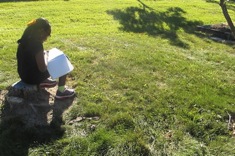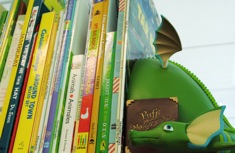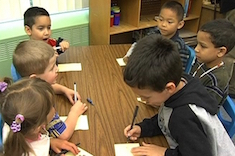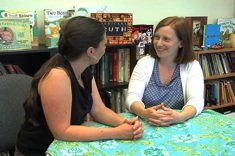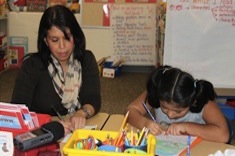Maria is already on her second page of writing. She has a lot to say about that family vacation to the beach. She is eager to share the shells she collected while her brother played in the ocean. At another table you can see Gabe, who is doodling on the margins of the pages, not sure what to write about since his summer consisted of babysitting his little brother and playing the same computer game over and over. Gabe can feel his anxiety rising, and he can’t wait until writing time is over.
Here’s what I remember from my elementary school years: all the kids who went to my school came from the same neighborhood, there was no diversity, and we all had similar experiences and economic backgrounds. Nowadays, this is not the case in most schools. As a group of teachers came together this summer to continue our conversations about teaching and learning, the topic of narrative writing and its challenges rose to the surface. We shared our concerns and frustrations. Every year, we start writing workshop with narrative writing as the first unit of study. One of the things we discovered was that as we discuss “small moments” with children, the overemphasis on the “things we did” or “places we visited” created some unintentional class and economic divisions among our group of writers.
We can’t change children’s reality outside of school. But we all agreed that we could change our language and lenses to discuss narrative writing.
We decided our language matters and the change needed to start with us. What if instead of saying, “Tell me what you did during the summer” we said, “Tell me about a moment in your life when you were very excited.” What if instead of prompting, “Tell me about a place you visited this summer” we asked, “What are some of your favorite moments with your family?” What if we asked, “Can you take me to a place that you once went and loved it? Why did you enjoy it? What made it so special?” Phrasing our questions through the lenses of tell me about your small moments is different from over-focusing on the moment itself. Reality tells us that for a lot of our students, life outside of school means dinner, watch TV or play video games, and off to bed. Then they repeat the process the next day. Experiences outside school may be limited, which is why many students struggle during this narrative writing unit of study.
Beyond Summer Narratives
Thinking about students’ experiences outside of school made this group of teachers discuss possibilities. What if we need to start rethinking experiences, building more shared events that all students would be excited to write about? In other words, part of the school budget money could be used for these shared experiences. They might include bringing plays to the school, inviting staff from the local zoo to talk about caring for animals, or hosting “game days” throughout the school year for students to learn about different cultures. So many fun and great school activities are reserved for the end of the school year, but what if we provide students ongoing shared experiences to write about throughout the year? Pair those experiences with the art of taking photos and documenting the moment, and we have primed students for writing on equal ground. Small events throughout the year can make a difference in the ways students think about narrative and their lives.
Bringing photographs to the classroom and bridging that life-and-school connection was another idea brainstormed. When a child holds a family picture in their hands, the writing becomes the tool by which to tell a different kind of story—a very personal one, and for children this is a big motivator. When students are looking at familiar faces in those photographs, they have a lot more to say. Not only are students more motivated to write about family when they remember a moment through a photograph but this also creates a powerful connection between child and teacher. So when we dive into a narrative unit with our students, let’s pause and think, Do I really want to know about you did last summer? Or do I want to know about who you are as a person?

